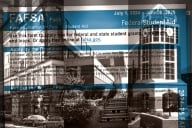You have /5 articles left.
Sign up for a free account or log in.
Baruch College has long been known as a strivers' institution. As the campus of the City University of New York focused on business, it attracts students who want to run companies or rule on Wall Street, but who can't afford a Wharton M.B.A. The college has become increasingly competitive in recent years -- while maintaining its tradition of serving low-income, first-generation Americans. More than 60 percent of students come from families with incomes less than $40,000 and nearly 80 percent of students have parents born outside the United States.
In recent years, Baruch has focused more attention on helping these students mix their academic lessons with the social skills that might help in an interview. This week, the Starr Foundation is announcing a grant of $2 million -- with possible additional matching funds of up to $3 million -- to expand those efforts. The grant is unusually large for one focused on preparing college students for jobs. A spokeswoman for the National Association of Colleges and Employers said that she could not think of a comparable award.
The funds will support a series of seminars and programs designed to bring students together with business leaders to see not only how they think, but how they act -- how they dress, interact with colleagues, eat, socialize and talk.
"Our students compete for jobs with students who in their own personal lives rub shoulders with executives. We need to do that, too," said Donna Haggarty, executive director for strategic partnerships at Baruch. She said that Baruch's efforts are based on interviews conducted with employers about the college's students.
Employers and prospective employers told Baruch that its students were "just as smart as those anywhere, harder working, less arrogant, and more inclined to jump in and get things done." Of course there is more to the business world, however un-meritocratic that reality is, and that's where the problem sets in for the college.
"What we've concluded is that -- fairly or not -- recruiters are looking for a certain presentation," Haggarty said. "If they sense that a student lacks that presentation -- whatever it is -- speech, dress, or whatever it is, it can be a very intangible thing. We want to make sure our students are not disregarded on the basis that isn't reflected in their application."
There is considerable evidence that many employers agree. A survey by the National Association of Colleges and Employers this year found that those doing hiring are likely to be strongly influenced by such factors as grooming-related matters (including non-traditional clothing), the quality of a handshake, and other traits that would not appear to be directly related to intelligence or drive.
Haggarty stressed that the new program wasn't about turning the college's professors into a bunch of Henry Higgins types. "This is about helping students take the talents they already have to the surface," she said. Baruch has created a number of programs, for example, to encourage students to engage in public speaking -- because speaking out is frowned upon in some of the students' native cultures but is essential in the American business world.
The additional funds will help make those programs permanent and provide them with more support, while creating seminars focused on other non-academic skills, and creating special internship opportunities so Baruch students can learn what American executives act like by working directly with them.
And if any Baruch students use their skills to impress someone in a phone interview and then lack the appropriate attire for an interview, not to worry. Ralph Lauren, who briefly attended Baruch, has donated a collection of suits that are available for interviews.








